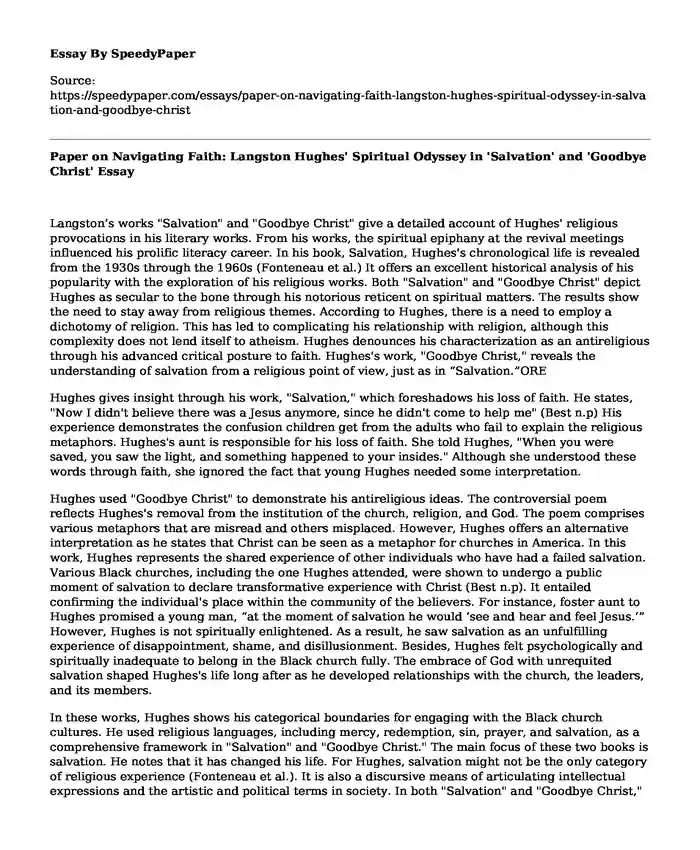
| Type of paper: | Essay |
| Categories: | Poem Religion American literature |
| Pages: | 3 |
| Wordcount: | 605 words |
Langston’s works "Salvation" and "Goodbye Christ" give a detailed account of Hughes' religious provocations in his literary works. From his works, the spiritual epiphany at the revival meetings influenced his prolific literacy career. In his book, Salvation, Hughes's chronological life is revealed from the 1930s through the 1960s (Fonteneau et al.) It offers an excellent historical analysis of his popularity with the exploration of his religious works. Both "Salvation" and "Goodbye Christ" depict Hughes as secular to the bone through his notorious reticent on spiritual matters. The results show the need to stay away from religious themes. According to Hughes, there is a need to employ a dichotomy of religion. This has led to complicating his relationship with religion, although this complexity does not lend itself to atheism. Hughes denounces his characterization as an antireligious through his advanced critical posture to faith. Hughes's work, "Goodbye Christ," reveals the understanding of salvation from a religious point of view, just as in “Salvation.”ORE
Hughes gives insight through his work, "Salvation," which foreshadows his loss of faith. He states, "Now I didn't believe there was a Jesus anymore, since he didn't come to help me" (Best n.p) His experience demonstrates the confusion children get from the adults who fail to explain the religious metaphors. Hughes's aunt is responsible for his loss of faith. She told Hughes, "When you were saved, you saw the light, and something happened to your insides." Although she understood these words through faith, she ignored the fact that young Hughes needed some interpretation.
Hughes used "Goodbye Christ" to demonstrate his antireligious ideas. The controversial poem reflects Hughes's removal from the institution of the church, religion, and God. The poem comprises various metaphors that are misread and others misplaced. However, Hughes offers an alternative interpretation as he states that Christ can be seen as a metaphor for churches in America. In this work, Hughes represents the shared experience of other individuals who have had a failed salvation. Various Black churches, including the one Hughes attended, were shown to undergo a public moment of salvation to declare transformative experience with Christ (Best n.p). It entailed confirming the individual's place within the community of the believers. For instance, foster aunt to Hughes promised a young man, “at the moment of salvation he would ‘see and hear and feel Jesus.’” However, Hughes is not spiritually enlightened. As a result, he saw salvation as an unfulfilling experience of disappointment, shame, and disillusionment. Besides, Hughes felt psychologically and spiritually inadequate to belong in the Black church fully. The embrace of God with unrequited salvation shaped Hughes's life long after as he developed relationships with the church, the leaders, and its members.
In these works, Hughes shows his categorical boundaries for engaging with the Black church cultures. He used religious languages, including mercy, redemption, sin, prayer, and salvation, as a comprehensive framework in "Salvation" and "Goodbye Christ." The main focus of these two books is salvation. He notes that it has changed his life. For Hughes, salvation might not be the only category of religious experience (Fonteneau et al.). It is also a discursive means of articulating intellectual expressions and the artistic and political terms in society. In both "Salvation" and "Goodbye Christ," Hughes merged the distinctions between the sacred and profane while blending his political and intellectual themes in the understanding of salvation.
Works Cited
Best, Wallace D. Langston's Salvation: American Religion and the Bard of Harlem. NYU P, 2019.
Fonteneau, Yvonne, et al. “The Collected Poems of Langston Hughes.” World Literature Today, 1996, doi:10.2307/40151942.ss
Cite this page
Paper on Navigating Faith: Langston Hughes' Spiritual Odyssey in 'Salvation' and 'Goodbye Christ'. (2024, Jan 05). Retrieved from https://speedypaper.com/essays/paper-on-navigating-faith-langston-hughes-spiritual-odyssey-in-salvation-and-goodbye-christ
Request Removal
If you are the original author of this essay and no longer wish to have it published on the SpeedyPaper website, please click below to request its removal:
- Religion Essay Example on Reformation in Heidelberg
- Paper Sample about Antigone, An Annotated Bibliography
- Essay Sample on Gender Stereotype in Children Literature
- Free Essay: Relationship Between War and Literature: Mars Song
- Death in Kakinimoto No Hitomaro's Work in the 'Manyoshu'. Essay Example
- Essay on God's Global Purpose: To Know and Follow Him
- Essay Sample: Crisis Intervention Strategies and Crisis Intervention Counseling
Popular categories




